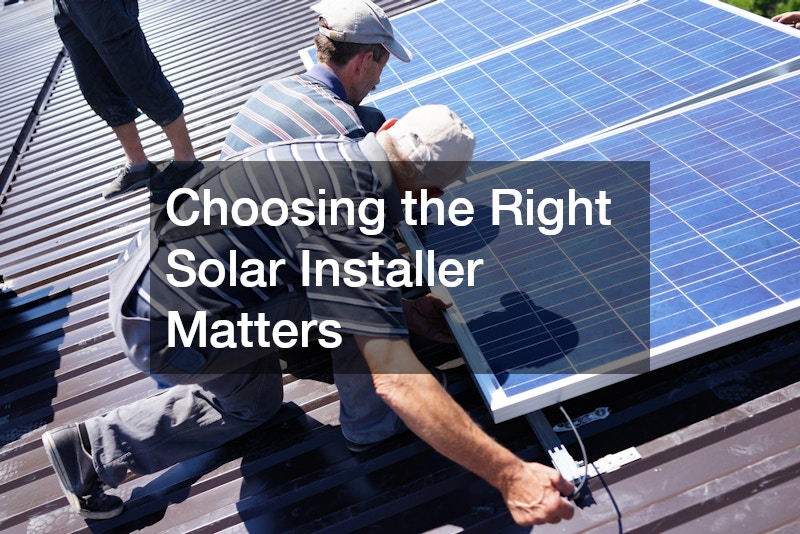In today’s world, making the most of solar energy is essential for reducing power bills and lowering environmental impact. Choosing a solar installer is just the first step. To truly maximise energy efficiency, homeowners need to understand how to optimise their system’s performance.
This blog outlines practical tips that ensure your solar setup delivers the best results for years to come.
Understanding Your Solar System’s Potential
Before diving into the finer points of energy efficiency, it’s important to grasp what your solar system can achieve. The size of your solar panel array, the quality of the equipment, and where it’s installed all influence overall performance. Your solar installer plays a vital role in determining these factors, but your ongoing care is just as important.
The orientation and tilt of panels affect how much sunlight they capture daily. Panels facing north in Australia usually perform best, but slight adjustments may be needed depending on your location. Shading is another critical factor. Trees, neighbouring buildings or other obstacles can significantly reduce the output of your solar system if they cast shadows during peak sunlight hours.
Maintenance & Cleaning for Peak Performance
Regular maintenance is key to ensuring your solar panels operate at maximum efficiency. Dust, dirt, bird droppings and other debris can build up on panels, blocking sunlight and reducing power generation. Although rain can naturally clean panels to some degree, it often isn’t enough for optimal performance.
Cleaning your solar panels carefully and regularly helps prevent energy loss. Use a soft brush or cloth with water — avoid harsh chemicals or abrasive materials that could damage the panels. Some solar installers offer maintenance plans that include periodic cleaning and system checks, which can be a worthwhile investment for long-term efficiency.
It’s also important to inspect your solar inverter and wiring for any signs of damage or wear. Faulty components can cause significant energy loss or system failure. When in doubt, consult your solar installer to conduct professional inspections and repairs.
Monitoring Energy Usage & System Output
To maximise energy efficiency, tracking how much electricity your solar system produces compared to your household consumption is essential. Many modern solar systems come with monitoring software or apps that allow homeowners to view real-time data and historical trends.
By regularly checking your system’s output, you can identify when performance drops and investigate causes. It might be as simple as a dirty panel or an issue requiring your solar installer’s attention. Monitoring also helps optimise energy use by adjusting when high-power appliances run to coincide with peak solar generation, reducing reliance on grid electricity.
Some households take this a step further by installing battery storage. While this involves an additional upfront cost, it allows surplus energy to be stored and used later when the sun isn’t shining. This can dramatically improve energy efficiency and reduce electricity bills over time.
Upgrading Components for Better Efficiency
Technology in the solar industry is evolving rapidly. If your solar system is several years old, it may benefit from upgrades that improve efficiency. For example, swapping older panels for more efficient models or upgrading your inverter can increase power generation without adding more panels.
Consulting a qualified solar installer is the best way to determine which upgrades make sense for your property. They can assess your current setup and recommend improvements based on your energy goals and budget.
Practical Energy-Saving Habits
Maximising solar energy efficiency is not only about the hardware but also about how you use energy in your home. Simple changes in daily habits can make a noticeable difference.
Consider running appliances such as washing machines, dishwashers and dryers during daylight hours when solar production is at its peak. Turning off unnecessary lights and electronics, using energy-efficient appliances and insulating your home properly also reduce overall energy demand, making the most of the solar power generated.
Choosing the Right Solar Installer Matters
A well-qualified solar installer will provide more than just the installation service. They can guide you through system design, help avoid shading issues and recommend suitable equipment that aligns with your efficiency goals. Choosing an experienced professional ensures that your system is optimised from the start and performs reliably for years.
Remember that the relationship with your solar installer doesn’t end once the system is installed. Ongoing support, maintenance advice and timely troubleshooting will help you maintain peak performance and get the most value out of your solar investment.
Maximising energy efficiency from your solar system requires a combined effort of smart installation, regular maintenance, careful monitoring and efficient energy use at home. Working with a trusted solar installer ensures your system is designed and installed for optimal performance. With the right approach and a little ongoing care, your solar investment can deliver substantial savings and contribute to a cleaner environment.
By following these practical tips, you can enjoy the full benefits of solar energy while reducing your carbon footprint. Whether you are just starting out or looking to improve an existing setup, prioritising efficiency will help you get the most from the sun’s power every day.
.

